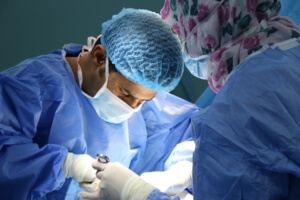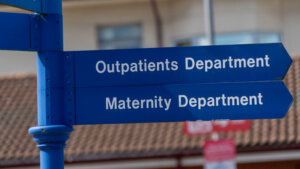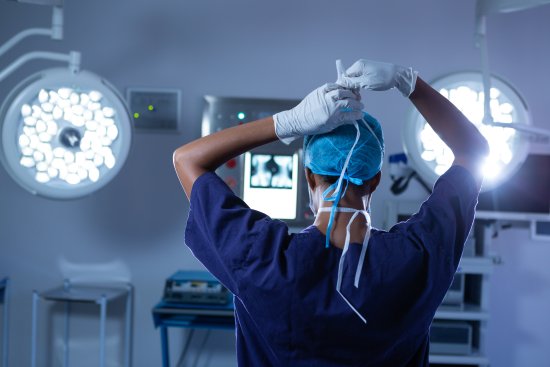Surgical Negligence Claims
Claim compensation with expert surgical negligence solicitors
If you believe you have experienced harm due to surgical negligence our expert solicitors can help you claim compensation
“Small but very effective and experienced team so every client benefits from the personal touch but also highly skilled litigation know-how. Capability of the team means they can handle all aspects of very complex cases as well as straightforward matters.”

“Osbornes Law is an established firm which handles a breadth of complex and high-value clinical negligence matters.”
Every year, millions of operations are carried out safely by the NHS and private hospitals across the UK. Most procedures go smoothly. However, when mistakes happen, the consequences can be serious, sometimes life-changing or even fatal. In such cases, patients may have grounds to bring a medical negligence claim.
What is surgical negligence?
Surgical negligence happens when a surgeon or medical team causes harm to a patient during surgery by failing to meet the required standard of care. This can mean making an avoidable mistake or worsening an existing condition.
Surgeons are legally and professionally expected to carry out procedures with a reasonable degree of skill and care. If they fall short of this standard, and the patient suffers as a result, a claim for surgical negligence may be justified.
To succeed in a claim, two key things must be proven:
- Breach of duty: That the treatment fell below the standard expected of a reasonably competent surgeon in that field.
- Causation: That the harm would not have occurred ‘but for’ the negligent act or omission.
For example, an orthopaedic surgeon’s actions will be judged against a responsible body of other orthopaedic surgeons. If no competent body would have acted the same way, negligence is likely established.
Common types of surgical negligence
There are many different types of surgical negligence. However, some of those most commonly experienced in practice include the performance of the wrong procedure or operating on the wrong body part.
- Wrong procedure or body part: Operating on the wrong body part or performing the incorrect procedure entirely.
- Foreign objects left inside the body: Leaving surgical tools, sponges, or clips inside the patient after surgery, often causing infection or pain.
- Nerve or organ damage: Unintended damage to nerves or internal organs, particularly when not recognised and treated promptly.
- Infections due to poor hygiene: Post-surgical infections (Sepsis, for example) caused by inadequate sterilisation or aftercare.
- Failure to obtain informed consent: If a patient is not properly informed and would have made a different decision had they known the risks, this may amount to negligence, even if a consent form was signed. Before surgery, patients must be fully informed about the risks, possible alternatives, and likely outcomes of the procedure.
Real case examples: How Osbornes Law has helped
Retained surgical staple after shoulder surgery
We represented a man who underwent an arthroscopy on his shoulder. A surgical staple fell into the wound and was left behind. This led to a serious infection, months of pain, and the need for further surgery. We secured a five-figure compensation sum, covering:
- Pain and suffering
- Private medical treatment costs
- Care provided by his partner
- Loss of earnings during recovery
Nerve injury following ankle surgery
Another client suffered permanent nerve damage during surgery to repair a fractured ankle. She had not been warned about the risk beforehand. The injury left her unable to return to work. We obtained expert evidence and successfully secured a settlement.
Undiagnosed organ damage
We have also supported women injured during routine surgeries where damage to the bladder or bowel was not identified in time. In some cases, these delays caused lifelong complications. Our legal team achieved admissions of fault and meaningful compensation.
Starting a surgical negligence claim
If you or a loved one has experienced an injury following a surgical procedure, you may have grounds for a claim based on surgical negligence. Understanding the process is essential to seeking justice and compensation for your injuries.
- Get expert legal advice: Our team of medical negligence solicitors have acted for many patients who have suffered injury as a result of surgical negligence. Get in touch if you wish for them to investigate your claim.
- Gather medical records: It will be necessary for our team to obtain all of your medical records to determine what went wrong and whether this could have been avoided. This documentation is crucial for establishing the facts of your case.
- Consult a medical expert: Often, we will need to instruct an independent medical expert to comment on the treatment you received and whether in their opinion the level of care fell below that which could be supported by a responsible body of surgeons. This expert will evaluate whether, in their opinion, the level of care fell below that which could be supported by a responsible body of surgeons. Their insights can significantly strengthen your claim.
Why choose Osbornes Law?
- Specialist clinical negligence solicitors with a proven track record in surgical negligence claims
- Accredited by the Law Society and members of the Action Against Medical Accidents panel
- No-win, no-fee available in most cases
- Compassionate, practical advice throughout your claim
Start your surgical negligence claim today
We understand how overwhelming it can be to deal with the aftermath of a surgical error. Our team is here to listen, support you, and fight for the compensation you deserve.
To speak with one of our solicitors, contact us by:
- Filling in our online enquiry form; or
- Calling us on 020 7485 8811
Contact us about a surgical negligence claim
Call us 020 7485 8811
Email us Send us an email and we’ll get back to you
Small but very effective and experienced team so every client benefits from the personal touch but also highly skilled litigation know-how. Capability of the team means they can handle all aspects of very complex cases as well as straightforward matters.
Jodi Newton holds over 20 years of experience in birth and surgical injury cases, including those pertaining to cerebral palsy, negligent treatment of sepsis, and negligent A&E treatment.
Osbornes is a very respected firm in the marketplace.
They handle really complex cases very well
The clinical negligence team are knowledgeable and professional in their approach and demonstrate a high level of skill in litigation work.
Osbornes Law offers experience in obstetric and fatal claims as well as niche cauda equina cases.
Osbornes Law is an established firm which handles a breadth of complex and high-value clinical negligence matters.
Osbornes has a skilled team of solicitors advising clients on a wide range of clinical negligence matters.
Hard working, approachable, good knowledge of clinical negligence and clients’ specific conditions
A joy to work with and always 100% client focused at all times.
The clinical negligence team at Osbornes is much lauded for its ability to ‘represent the diverse range of London-based clients
“The team is very quick and efficient in responding."
"Obsbornes Law is always client-focused and works tirelessly to obtain the best outcomes for clients."
Stephanie Prior is head of the clinical negligence department at Osbornes Law. She acts on a wide range of issues, including claims for brain injuries sustained at birth and delays in diagnosis. She frequently represents clients in fatal claims involving surgical error.
‘They are ambitious for their clients and expect high standards from all who work with them.’
"Osbornes somehow combine the accessibility of a local firm, with the professional standards of a national or city outfit."
"Osbornes, is described as having ‘superb judgement and a medical knowledge that is second to none."
Stephanie has developed a particularly strong reputation for her handling of birth injury claims, as well as cases concerning surgical negligence and delays in surgery.
"An excellent firm which achieves fantastic outcomes for clients."
"Stephanie Prior takes on complex cases and gets excellent results. She has a background in medicine which serves her clients well and is a realistic but tough litigator."
"Stephanie Prior is hugely dedicated, adored by her clients, tenacious, efficient and extremely knowledgeable."
"Stephanie Prior is very good with troubled clients and is easily able to make them feel at ease."
"Stephanie shows sensitivity and deals with things in an understanding way."
Osbornes provides a very intimate and personal client service which is increasingly rare in this sector.
The lawyers in the team are highly experienced and will drive cases very hard on behalf of their clients.
"Stephanie Prior has a realistic attitude to the complexities of the cases. She wins the trust of her clients and goes the extra mile to ensure they get the best outcomes."
"Stephanie Prior... manages a varied caseload, including obstetric claims, child and adult brain injury cases and fatal and non-fatal spinal cord injury cases."
"Stephanie is experienced, knowledgeable of all aspects of clinical negligence work, and strategic in running cases."
"An exceptional outfit. They take on difficult cases, fight hard and win."
"The team were extremely professional in putting my needs first. There was a joined-up approach to catering for the client, and all lawyers involved were briefed and constructive."
Stephanie Prior is always very professional and kind. Highly recommended.
Quite simply excellent, with a highly competent and well-rounded team. They understand complex medical litigation and have been our lifesavers, and we will always owe them our immense gratitude.
News & InsightsVIEW ALL
- 12.5.2025
Complaints Against Suspended Surgeon Ms Kuldeep Stohr
Ms Kuldeep Stohr, orthopaedic surgeon at Addenbrooke’s Hospital suspended In February 2025, Cambridge University Hospitals NHS Foundation Trust (CUH) confirmed...
Read more - 6.5.2025
Six-Figure Settlement for Negligent C-Section Delivery
Osbornes secures a six-figure settlement following a negligent caesarean section delivery Jodi Newton, Partner and head of our Obstetric and...
Read more - 6.5.2025
Six-Figure Settlement for Negligent Shoulder Surgery
Settlement following a claim against Bedfordshire Hospitals NHS Foundation Trust Elline Demetriou, a Solicitor in our clinical negligence team, acted...
Read more - 13.3.2025
Addenbrooke’s Hospital Complaints
Review finds harm to children by surgeon at Addenbrooke’s Hospital An independent review by Cambridge University Hospitals NHS Foundation...
Read more - 4.2.2025
Claim Settled for Child’s Surgery Injuries
Osbornes secures settlement for child’s surgery-related injuries Osbornes Law successfully represented a minor, X, in a claim against two...
Read more - 9.5.2024
Claim Against Royal Free London NHS Foundation Trust...
Client obtains settlement after being victim of a surgical negligence Jodi Newton, Partner in our Clinical Negligence department, recently settled...
Read more - 14.12.2022
Successful settlement for negligent care during kidney transplant...
Claimant v Royal Free London NHS Trust Osbornes have reached a settlement agreement on behalf of a Claimant who brought...
Read more - 14.4.2022
Settlement for Failed Fibroid Surgery
Jodi Newton was instructed in a claim against London North West University Healthcare NHS Trust where our client suffered serious...
Read more - 23.3.2022
Claim for Injury to Ulnar Nerve During Bowel...
Claim against Luton & Dunstable University Hospital Osbornes Law was instructed in a claim against Luton & Dunstable University Hospital...
Read more - 25.1.2022
Serious Injury Following TVT Surgery
Case Summary Our client, SG, attended her GP in December 2015, complaining of urinary symptoms, including leaking when she laughed or...
Read more - 12.11.2014
When is Cataract Surgery Negligent?
Preventing Cataract Surgery Negligence Losing your eyesight is a life-changing experience. When preparing for surgery to save your eyesight, you...
Read more


















